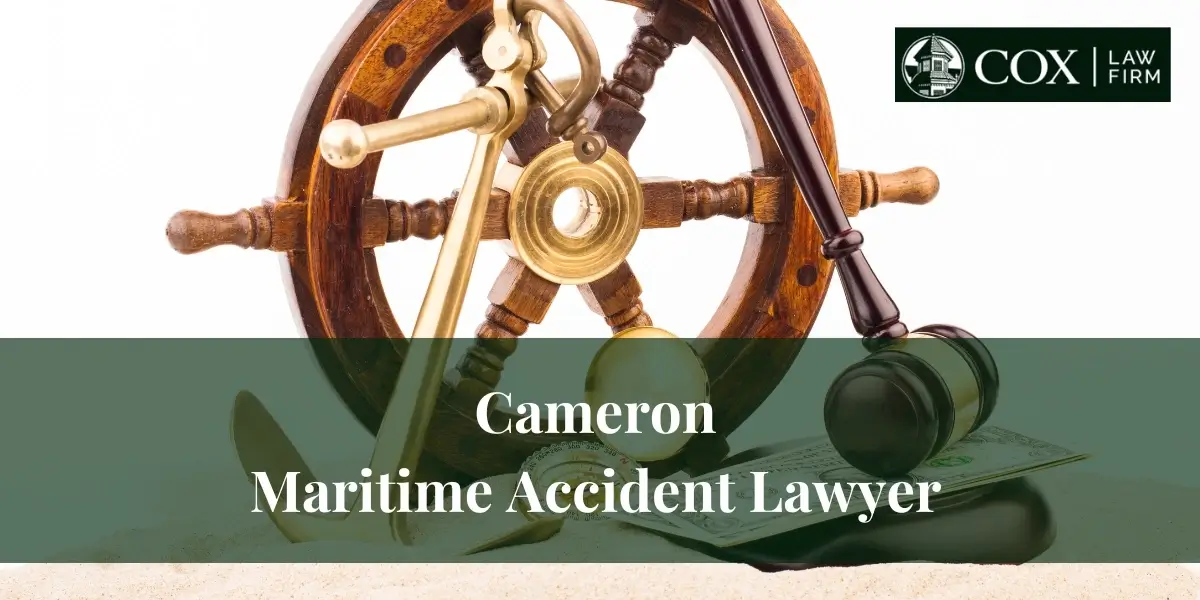Cameron Maritime Accident Lawyer
Cameron Maritime Accident Attorney
The maritime industry carries risks, and accidents often stem from negligence. Maritime law exists to hold responsible parties accountable for their actions. Those affected by these accidents deserve to be compensated fairly. A Cameron maritime accident lawyer can provide the safest steps to take after a maritime accident.

Every Client Is a Priority
Maritime accident victims deserve an attorney who fights with determination and heart. The attorneys at Cox Law Firm are known for thorough and compassionate service. Our clients consistently praise our professional and approachable attitude. From the first interaction, our clients know that their case is in capable hands.
What Does Maritime Law Cover?
Maritime law provides a legal framework to address accidents and injuries on navigable waters. The Jones Act is one of the most important pieces of legislation in this area, protecting seamen injured during the course of work duties. Unlike typical workers’ compensation claims, the Jones Act allows seamen to sue for damages.
Beyond the Jones Act, general maritime law governs maintenance and cure benefits so that injured workers receive support during recovery. Federal courts often have jurisdiction over maritime cases, but some claims, like passenger injuries, might involve state courts.
Maritime accidents occur in diverse environments and often involve unique risks. Workers aboard ships and offshore platforms face hazards that can lead to severe injuries. From collisions to equipment failures, these accidents highlight the importance of safety regulations.
What To Do After a Maritime Accident
Maritime accidents in Cameron, bring unique challenges that set them apart from land-based accidents. Workers and passengers on vessels face laws, deadlines, and procedures different from those who suffer injuries on land. The steps you take right after a maritime accident can make a major difference in your ability to get fair compensation for your injuries.
- Seek immediate medical attention. Visit a doctor or medical facility as soon as possible after the accident, even if you initially feel unharmed. Some injuries, such as internal bleeding or concussions, might not show symptoms right away but could become serious without treatment. Keep all medical bills, prescriptions, and treatment records, as these documents can prove that your injuries resulted from the accident.
- Report the accident. Tell your supervisor, the ship’s captain, or the vessel owner about what happened. Write down the exact time, location, and conditions when you report the accident. Ask for a copy of any forms you fill out. A formal accident report creates an official record that shows when and where you got hurt. This report helps prevent anyone from claiming later that your injuries happened somewhere else.
- Document evidence. Take photos of where you got hurt, any equipment involved, and any visible injuries. Write down the names and phone numbers of people who saw what happened. Save any torn clothing or broken equipment from the accident. Keep a daily log of your pain levels and how your injuries affect your work and daily life. These details paint a clear picture of the accident scene and your recovery process.
- Consult a maritime attorney. Talk to a lawyer who focuses on maritime law before making any decisions about your case. Maritime laws differ from regular personal injury laws and have special rules about time limits and which court can hear your case. A lawyer can explain your rights under laws like the Jones Act or Longshore Act. They can also tell you how much your case might be worth.
- Avoid signing agreements. Don’t sign any papers from the company or their insurance provider until a lawyer reviews them. Companies often offer quick settlements that seem good but may not cover all your needs. Read every document carefully. An agreement might contain language that waives your right to sue. Wait until you know the full extent of your injuries before accepting any compensation.
Following these steps after a maritime accident can protect your health and your legal rights. Each action you take can build evidence for your case and prevent others from disputing your claim later. Working with experienced professionals who understand maritime law gives you the chance to receive compensation that fully covers your medical bills, lost wages, and other costs from the accident.
FAQs
What Is Comparative Negligence in Maritime Law?
Comparative negligence in maritime law determines how liability is shared when multiple parties contribute to an accident. Unlike systems that completely prevent recovery for partial fault, maritime law allows injured parties to recover compensation even if they share some responsibility. The court reviews each party’s degree of fault and reduces the award accordingly to promote fairness while assigning damages.
What Are Maritime Law Damages?
Maritime law damages cover a wide range of losses to compensate injured individuals. These can include medical expenses, lost wages, and costs for rehabilitation or therapy. In cases of severe injuries, damages for pain and suffering, mental anguish, or permanent disability might also be awarded. Maritime law can also provide maintenance and cure benefits, which help seamen receive medical care and living expenses until they recover.
How Do Maritime Laws Differ From Personal Injury Laws?
Maritime laws differ from personal injury laws because they only apply to accidents occurring on bodies of water, including seas, rivers, and lakes used for commerce. While personal injury laws govern most land-based injuries, maritime laws cover specific incidents involving seamen, offshore workers, and vessel passengers. Maritime cases can involve federal laws like the Jones Act, which allows injured seamen to sue their employers for negligence.
What Types of Maritime Accidents Are Covered Under Maritime Law?
The types of maritime accidents that are covered under maritime law include incidents involving seamen injured while performing their duties on ships, offshore drilling accidents, and accidents at ports or harbors. It also applies to collisions between vessels, accidents on commercial fishing boats, and harm to passengers on cruise ships or ferries. Any incident tied to maritime activities might fall under maritime law.
Tailored Advice and Experienced Representation With Cox Law Firm
Victims of maritime accidents deserve understanding and guidance during what can be a difficult journey. Receiving compensation helps hold companies accountable and promotes a victim’s financial recovery. For assistance with your exact situation, schedule a consultation with Cox Law Firm to secure what you’re owed.
Request Your
Free Consultation
Fields Marked With An “ * ” Are Required

